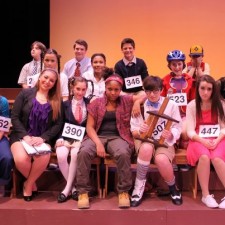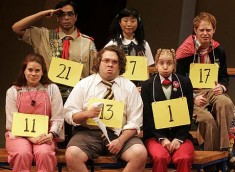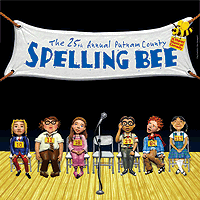Filichia Features: White Plains' Spelling Bee with Real Teens
Filichia Features: White Plains' Spelling Bee with Real Teens
Let’s face it: most directors of professional or community productions of The 25th Annual Putnam County Spelling Bee cast too old.
They seem to ignore the fact that this competition is supposed to be for teens. Do they fear that bookwriter Rachel Sheinkin and composer-lyricist William Finn created material that’s too demanding for genuine teenagers?
At the White Plains Performing Arts Center in suburban New York, director Greg Baccarini recently proved that kids can indeed play these kids. For The Conservatory Theater that the center sponsors, Baccarini cast a lucky 13 teens who conquered Sheinkin’s quirky characters and Finn’s ambitious score.
(Of course, many high school drama teachers will tell you: if you don’t tell kids that something is impossible, they simply go out and accomplish it.)
All right, Baccarini had to cheat a little by changing the sex of two characters. First, he turned over a new Leaf Coneybear. The speller whose pronunciation is quite pronounced, was played (quite nicely, incidentally) by Michelle Morris.
And why not make the change? True, the artist formerly known as Leaf Phoenix has since preferred Joaquin as his first name, but Leaf isn’t yet seen as a gender-specific name. A girl’s having it would not be as fraught-filled as would a boy named Sue.

Baccarini’s other sex-switch, however, necessitated a name change. Mitch Mahoney, the “comfort counselor” for unsuccessful contestants, became Maxine Mahoney. The actress named Jazz Jenkins got some solid laughs in the not-at-all gentle way that she dismissed each loser.
After that, Baccarini decided to take an option offered by the script – and one that parents who knew Spelling Bee were probably happy to hear. Here Chip Tolentino, who’d lost his concentration after he’d spotted Leaf’s alluring sister in the audience, didn’t sing about his “unfortunate erection.” Instead, Baccarini used the option of “My Unfortunate Distraction.” David Townley proved that one didn’t need the more flamboyant word to get the audience to enjoy the song.
Otherwise, it was Spelling Bee business as usual. There was no soft-pedaling on the tough or even borderline-controversial issues. Maxine was still doing community service for her (unnamed) crime. Vice-Principal Panch didn’t hold back on telling about his nervous breakdown. (Ian Gordon offered the requisite shame and strength.) Logan Schwartzandgrubenierre was still the head of the Gay/Straight Alliance at her high school. (Kelly Ainsworth showed commensurate pride.)
If that last-named kid’s last name seems unwieldy, there’s good reason for it. Logan’s two gay fathers apparently wanted their adopted daughter to use both their surnames, but didn’t want the all-too-conventional hyphen between them. Instead, they chose to include the article “and” to link their two names; as a result, a ponderous 19-letter name became an even more portly 22-letter moniker.
Although Logan would certainly welcome a victory, she’s chagrined that her fathers want her to win at any cost. Here’s where Spelling Bee has a valuable lesson to teach about parents who expect their offspring to right their own past failures.
Panch and the cameos for four parents in the show brought up another potential problem. When you have a conservatory full of kids, how do you cast adult roles? In addition to those five, there’s Rona Lisa Peretti, who’s in charge of the contest. Considering that she was the winner of the Third Annual Putnam County Spelling Bee, Rona has been out of high school for at least 22 years.

But isn’t there always at least one especially mature girl in every drama club? Baccarini had no a problem in finding a lass who had enough authority: April Nuovo was in command from word one. When she commented on the action – such as a breathy but whispered “A rare lapse in concentration for Mr. Tolentino!” -- Nuovo showed a hushed tone worthy of a tennis announcer at the U.S. Open.
Still, it’s the teens’ show. Here, David Littlefield portrayed William Barfee. The poor soul has taped glasses, an untucked-in shirt and mismatched clothes; if men routinely wore two bow ties instead of just one, you can bet that Barfee’s pair would clash. Then, in addition to his sartorial problems, Barfee suffers from a mucus-membrane disorder and an intolerance to peanuts.
New Hampshire used to have a natural rock formation known as “The Old Man of the Mountain,” also known as “The Great Stone Face” because it did seem to show a forehead, nose, lips and chin. Well, the whole thing collapsed in 2003, but Spelling Bee’s Marcy Park has taken up the mantle. This character must always show a stone face absolutely emotion-free – at least until she comes to life when she sabotages herself. Isabella Duenas achieved superbly as the overachiever.
Sarah Cammarata had even more vulnerability than Celia Keenan-Bolger expressed in the original production. This made the ending of the show all the more poignant. When the competition came down tolovely Olive and bestial Barfee, one could feel the audience assume that Barfee would throw the bee in order to be gallant or even win her favors.
Forget it: Barfee could easily sing a song called “What I Didn’t Do for Love.” Credit to David Littlefield, too, for maintaining the suspense and faking out the crowd.
So a good time was had by all. Of all the musical comedies ever written, Spelling Bee may well offer the most guaranteed laughs. The audience always roars at each arcane word that would be known to only the most erudite of grammarians. When the definition is given and the obscure word is used in a sentence, the laughs build exponentially.
One of the best aspects of producing Spelling Bee is that it doesn’t demand an elaborate set. Considering that you’re replicating the sterility of the average high school’s auditorium (or cafetorium), you need nothing ornate. A set of bleachers, a table, trophy stand, three chairs and a piano (for both your musical director and Marcy) will swing it. Totally bright, never-changing lighting befitting any genuine spelling bee is all that’s required, too. For that matter, you don’t even need a true stage; do it in the school’s gym, where it’s supposed to be set, anyway. There’s never been an easier way for a school to offer site-specific theater.
And, as The Conservatory Theater at the White Plains Performing Arts Center proved, youth will be served and will serve the show, too.
Note: This article has recently been edited.

You may e-mail Peter at pfilichia@aol.com. Check out his weekly column each Tuesday at www.masterworksbroadway.com and each Friday at www.kritzerland.com. His newest book, Broadway Musical MVPs, 1960-2010: The Most Valuable Players of the Past 50 Seasons, is now available through Applause Books and at www.amazon.com.


























